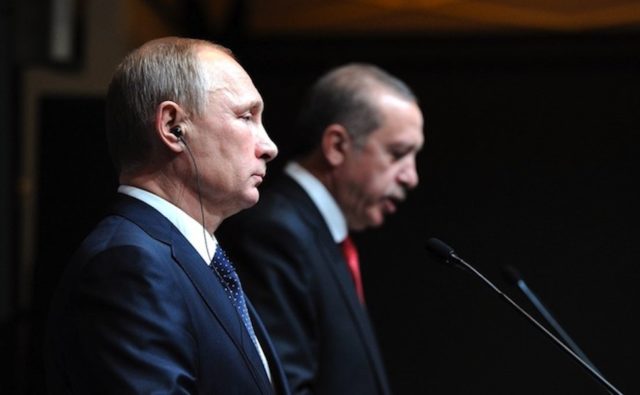
Russian warplanes bombed a Turkish army unit operating in Syria on Thursday morning, killing three Turkish soldiers. Eleven others were injured, according to a senior military official in Moscow.
Kremlin press secretary Dmitry Peskov told reporters that Russian President Vladimir Putin had expressed his condolences for the lives lost in a phone call with President Recep Tayyip Erdogan. Peskov also explained that the servicemen were killed “as a result of incoordination in Russian Air Force airstrikes against terrorists during the joint operation to liberate al-Bab,” suggesting a level of cooperation between Turkish and Russian forces in Syria.
Turkish troops have been working with opposition forces to retake the city of al-Bab, about 25 miles northeast of Aleppo, from Islamic State fighters. The city also lies on an important highway leading to nearby Turkey and Kurdish-controlled areas.
Thursday’s incident highlights not just the level of involvement Syria’s neighbors have in its civil war, but also the understanding reached between these regional powers in shaping the outcome of the conflict. In contrast to the hostility between Moscow and Ankara after Turkey shot down a Russian fighter jet that crossed into its territory in 2015, relations this time don’t show any signs of souring. There is still a possibility, however, that when ISIS is ousted from al-Bab and Turkish-supported rebel troops face Assad-supported forces, political agreements may fall victim to revenge fighting.
In a region devoid of U.S. political leadership, neighboring countries are ensuring that their interests are protected. Since late last year, Turkey, Russia, and Iran have entered talks on how to manage the conflict themselves, coming up with a fragile ceasefire. At a round of negotiations earlier this week in Astana, the capital of Kazakhstan, Moscow, Ankara, and Tehran agreed on a mechanism called the Joint Operational Group (JOG), to monitor the conflict and ceasefire violations. While experts have long understood that outside powers would likely dictate the eventual outcome of the Syrian Civil War, Thursday’s inadvertent bombing shows that regional actors, not the United States, find the stakes too high to end their engagement.

